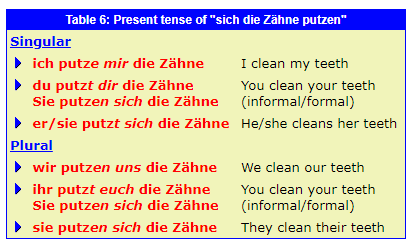Reflexive verbs concerning the body
The dative reflexive pronoun is used in German with certain verbs when they refer to doing things to parts of the body (sich waschen) and putting on or taking off articles of clothing (sich anziehen, sich ausziehen).
The dative reflexive pronoun must be used when you specify which part of your body you are washing or which article of clothing you are putting on or taking off. Furthermore, the definite article is used to refer to the specific part of the body, wheras in English the possessive (my, your, his etc.) is used. It is therefore the task of the dative reflexive pronoun to indicate possession.

Great care must therefore be taken to distinguish between the following pairs of verbs:
Ich wasche mich. (I'm having a wash.)
Ich wasche mir die Hände. (I'm washing my hands.)
Du ziehst dich an. (You get dressed.)
Du ziehst dir die Hose an. (You put your trousers on.)
The same construction is also used in German to translate "to clean one's teeth". The full present tense of this construction is given below.

 英语
英语 日语
日语 韩语
韩语 法语
法语 西班牙语
西班牙语 意大利语
意大利语 阿拉伯语
阿拉伯语 葡萄牙语
葡萄牙语 越南语
越南语 俄语
俄语 芬兰语
芬兰语 泰语
泰语 丹麦语
丹麦语 对外汉语
对外汉语

